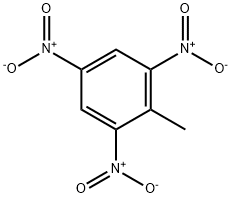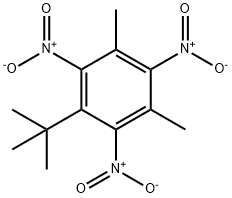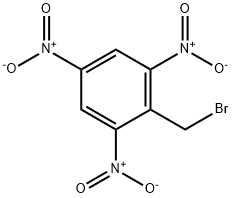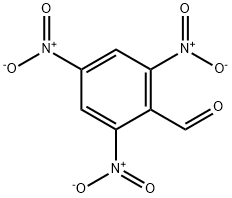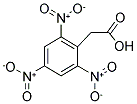2,4,6-Trinitrotoluenesolution , 1.00mg/ml, matrix: methanol , 118-96-7
Synonym(s):
TNT
CAS NO.:118-96-7
Empirical Formula: C7H5N3O6
Molecular Weight: 227.13
MDL number: MFCD00041875
EINECS: 204-289-6
PRODUCT Properties
| Melting point: | 80.9℃ |
| Boiling point: | 335–340°C |
| Density | 1.654g/cm3 |
| vapor pressure | 0.2 at 20 °C (NIOSH, 1997)4.26 at 54.76 °C, 2.557 at 72.49 °C, 4.347 at 76.06 °C (Knuden effusion method, Lenchitz andVelicky, 1970) |
| refractive index | 1.5500 (estimate) |
| Flash point: | 2 °C |
| storage temp. | 2-8°C |
| solubility | Solubility Very sparingly soluble in water; soluble in acetone, benzene; less soluble in ethanol |
| form | crystals |
| color | Yellow |
| PH Range | Colorless (11.5) to orange (14.0) |
| Water Solubility | 0.12g/L(20.0 ºC) |
| Exposure limits | TLV-TWA (skin) 0.5 mg/m3 (ACGIH and MSHA), 1.50 mg/m3 (OSHA). |
| Dielectric constant | 2.2(20℃) |
| Stability: | Unstable. Risk of explosion if heated or struck. Reacts violently - potentially explosively - with reducing agents. Reacts with heavy metals. |
| Major Application | Explosive, energetic materials, preparation of diamond |
| LogP | 1.65 at 20℃ |
| CAS DataBase Reference | 118-96-7(CAS DataBase Reference) |
| IARC | 3 (Vol. 65) 1996 |
| EPA Substance Registry System | Trinitrotoluene (118-96-7) |
Description and Uses
2,4,6-Trinitrotoluene (TNT) is a yellow, odourless, unstable solid. TNT does not occur naturally in the environment. TNT is an explosive used in military shells, bombs, and grenades; in industrial uses; and in underwater blasting. TNT is a high explosive that is unaffected by ordinary shocks and therefore must be set off by a detonator. TNT is often mixed with other explosives such as ammonium nitrate to form amatol. Because it is insensitive to shock and must be exploded with a detonator, it is the most favoured explosive used in munitions and construction. TNT reacts violently, is potentially explosively, reacts with heavy metals, and is a chemical with risk of explosion if heated or struck.
2,4,6-Trinitrotoluene (TNT) is used as a high explosive in mining and in military. It is produced by nitration of toluene with a mixture of nitric and sulfuric acids.
Safety
| Symbol(GHS) |   GHS02,GHS07 |
| Signal word | Danger |
| Hazard statements | H225-H302+H312+H332-H319 |
| Precautionary statements | P210-P261-P302+P352+P312-P304+P340+P312-P337+P313-P403+P235 |
| Hazard Codes | E,T,N,Xn,F,B |
| Risk Statements | 2-23/24/25-33-51/53-36-20/21/22-11-1 |
| Safety Statements | 35-45-61-36/37-26-16 |
| RIDADR | 0209 |
| OEB | C |
| OEL | TWA: 0.5 mg/m3 [skin] |
| WGK Germany | 2 |
| HazardClass | 1.1D |
| Hazardous Substances Data | 118-96-7(Hazardous Substances Data) |
| Toxicity | Acute oral LD50 in mice 660 mg/kg, rats 795 (quoted, RTECS, 1985). |
| IDLA | 500 mg/m3 |

